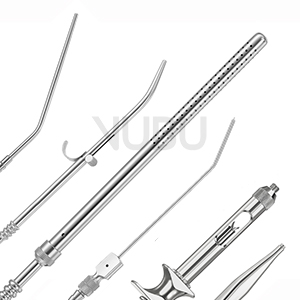Our syringes and suction tubes are specifically designed for the aspiration of bodily fluids and meet the highest medical standards. Fast and effective suction is particularly crucial during surgical procedures to ensure optimal visibility and patient safety. Our suction tubes offer flexible connection options, including the proven Luer-Lock system and the convenient quick-connect system, ensuring easy and secure handling.
A particular highlight of our product range is our puncture instruments, such as biopsy needles and trocars. These instruments enable safe and minimally invasive access to body cavities and are indispensable for diagnostic and therapeutic procedures. Precision and quality are our top priorities.
+++ New Category: Instruments for Plastic Surgery +++
We are excited to introduce our new product line for plastic surgery. Special emphasis is placed on our instruments for infiltration and liposuction, including specialized liposuction cannulas and handles. These instruments are designed for maximum efficiency and patient safety, supporting surgeons in performing complex procedures.
Quality and Precision in Every Component
Our guide needles, stopcocks, and connectors are manufactured using state-of-the-art technology and undergo strict quality control. Each product is tested for functionality, durability, and safety to meet the high demands of medical applications.
Historical Milestones in Medical Technology
Many of our instruments bear the names of renowned physicians and pioneers in medicine who laid the foundation for modern treatment methods with their inventions. These luminaries include:
NELSON, BUELAU, CAMPBELL, and OCHSNER for puncture instruments.
LANDAU, JOHANSSON, EICKEN, and LICHTWITZ for the development of cannulas and accessories.
DOUGLAS, PIERCE, KRAUSE, COAKLEY, and RUSKIN for bringing various cannulas to mass production.
YANKAUER, WALTON, ANDREW-PINCHON, and COUPLAND, whose names are familiar to every medical professional today.
The invention of connectors and stopcocks can also be attributed to visionary physicians such as BYRD, POOLE, BABY-POOLE, COOLEY, FRAZIER, PLESTER, FERGUSON, EICKEN-KILLIAN, WULLSTEIN, ADSON, COGSWELL, and LUER. Their innovations have had a lasting impact on medical technology.
Modern Standards in Liposuction and Puncture
Today, instruments such as MONOPORT, TRIPORT, and MERCEDES cannulas are indispensable in modern medical technology. Other innovative designs, such as SHARK and COBRA cannulas, as well as instruments by SALAH, KLIMA-ROSSEGGER, TUOHY, MENGHINI, QUINKE, ARTERIOGRAPHY, SCHMID, VERRES, and JANET, set new standards in efficiency and safety.
Conclusion
Our product range combines traditional craftsmanship with cutting-edge technology. We are proud to support doctors and medical professionals with instruments of the highest quality, which are indispensable in both diagnostics and therapy. Explore our products and benefit from our longstanding expertise in medical technology.
In medicine, a puncture is the targeted insertion of a needle or other pointed instrument. The tissue fluid or sample taken is called punctate. A puncture can be used for injection into the body (e.g. intravenous injection) or for removal from the body (e.g. lumbar puncture). For this, hollow needles (cannula, trocar) are used. Punctures are made for the injection of liquid medication, for the removal of body fluids such as blood, urine (bladder puncture), synovia (synovial fluid), cerebrospinal fluid (brain water) (lumbar puncture), peritoneal fluid, pleural fluid, bone marrow (bone marrow puncture), for taking tissue samples (fine needle biopsy ), for draining pathological fluid accumulations and for draining gas accumulations. Some organs are easy to puncture if they have the appropriate skills (e.g. superficial blood vessels, skin, liver). Other organs are difficult to puncture or the puncture is dangerous due to injury to the organ or neighboring organs (e.g. spleen, gallbladder, intestine). Imaging methods such as ultrasound or CT are used to puncture deeper organs.
